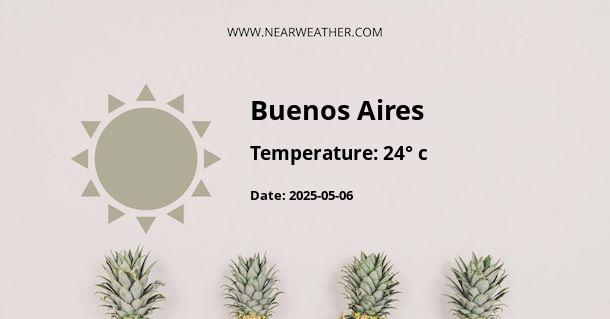Buenos Aires Climate and Weather Overview
Buenos Aires, the capital city of Argentina, is renowned for its rich culture, vibrant history, and diverse architecture. Situated on the southeastern coast of South America, the city experiences a humid subtropical climate with four distinct seasons. Understanding the weather patterns and climatic conditions of Buenos Aires is essential for both residents and visitors to effectively plan their activities throughout the year.
Annual Weather Trends
Let's delve into the detailed breakdown of the weather in Buenos Aires throughout the year. The following table outlines the average monthly temperature and precipitation in the city:
| Month | Average Temperature (°C) | Precipitation (mm) |
|---|---|---|
| January | 25 | 120 |
| February | 24 | 130 |
| March | 22 | 160 |
| April | 19 | 90 |
| May | 15 | 70 |
| June | 12 | 60 |
| July | 12 | 60 |
| August | 14 | 60 |
| September | 15 | 80 |
| October | 18 | 110 |
| November | 21 | 110 |
| December | 23 | 110 |
As depicted in the table, Buenos Aires experiences a distinct variation in temperature and precipitation throughout the year. The city encounters its warmest months from December to February, with average temperatures around 24-25°C. January marks the peak of summer, characterized by high humidity and occasional thunderstorms.
Conversely, the winter months, particularly June and July, bring cooler temperatures, averaging around 12°C. However, snowfall is extremely rare in the city due to its subtropical climate.
Precipitation and Seasons
Buenos Aires experiences a moderate level of precipitation across the year, with the wettest months falling between January and March. During this period, the city encounters an average of 120-160mm of rainfall per month. Conversely, the winter months from June to August are relatively drier, with precipitation levels dropping to approximately 60mm per month.
The seasonal variation in precipitation also impacts the vegetation and agricultural activities in and around Buenos Aires. The city's lush greenery owes much to the sufficient rainfall in the warmer months, which sustains the surrounding flora and contributes to its picturesque landscapes.
Extreme Weather Events
While Buenos Aires generally experiences mild weather, the city is not immune to occasional extreme weather events. Thunderstorms are common during the summer months, and intense rainfall may lead to localized flooding in certain areas of the city. Additionally, heatwaves can occur during the peak of summer, with temperatures occasionally surpassing 35°C.
It is important for residents and tourists to stay informed about weather forecasts and heed any advisories issued by local authorities during such events to ensure their safety and wellbeing.
Conclusion
In conclusion, Buenos Aires offers a diverse climate with distinct seasonal changes, ranging from warm and humid summers to cool and relatively dry winters. By understanding the weather patterns and climatic conditions of the city throughout the year, individuals can effectively plan their activities and make the most of their time in this captivating urban landscape.
Whether one is exploring the historical sites, immersing in the local culture, or simply enjoying the delightful cuisine, being mindful of the weather can significantly enhance the overall experience in Buenos Aires.
A - Buenos Aires's Latitude is 9.046020 & Longitude is -69.747414.
A - Weather in Buenos Aires is 29° today.
A - Climate Conditions in Buenos Aires shows overcast clouds today.
A - Humidity in Buenos Aires is 53% today.
A - Wind speed in Buenos Aires is 6.01 km/h, flowing at 29° wind direction. today.
